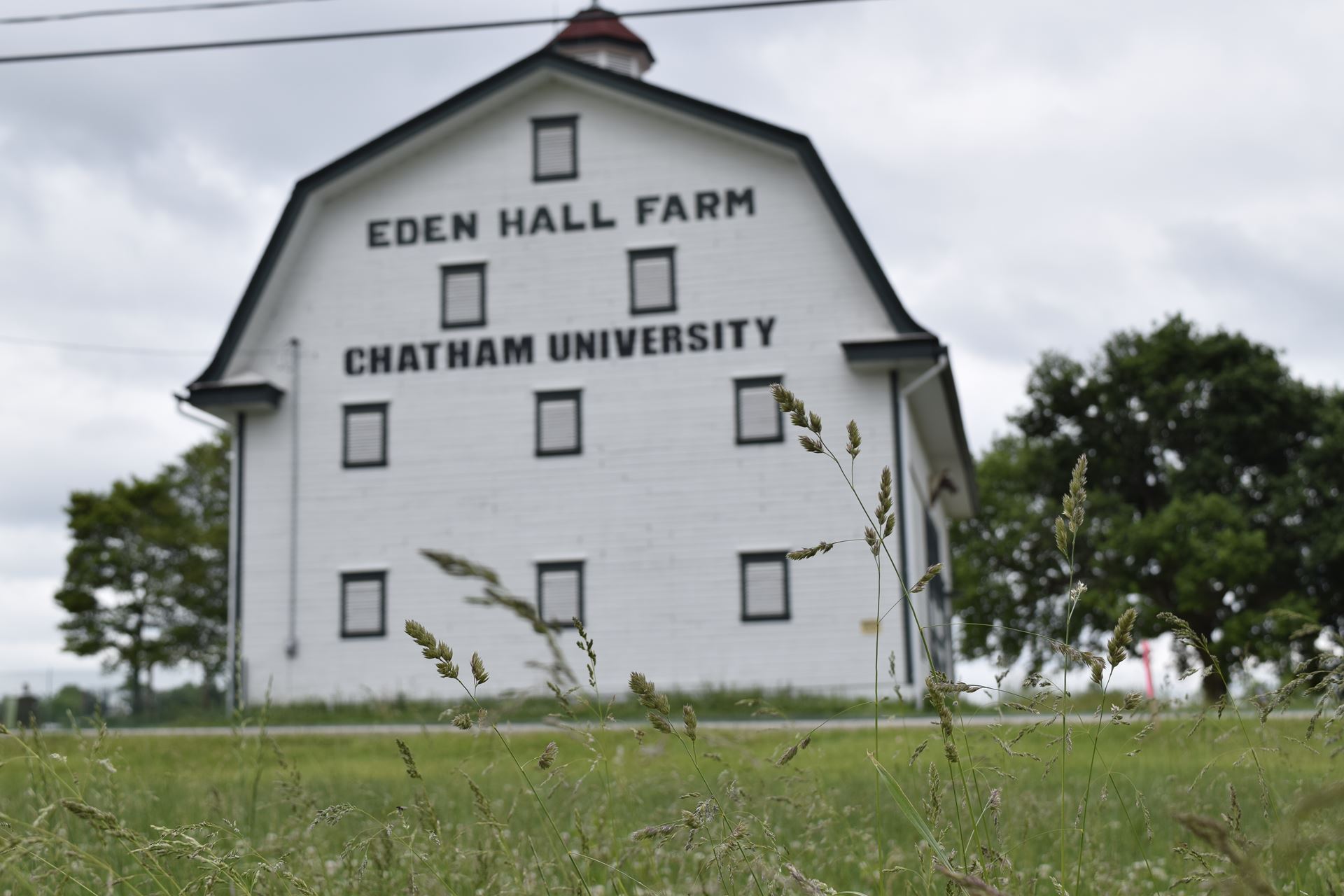Article by Djuna Gulliver
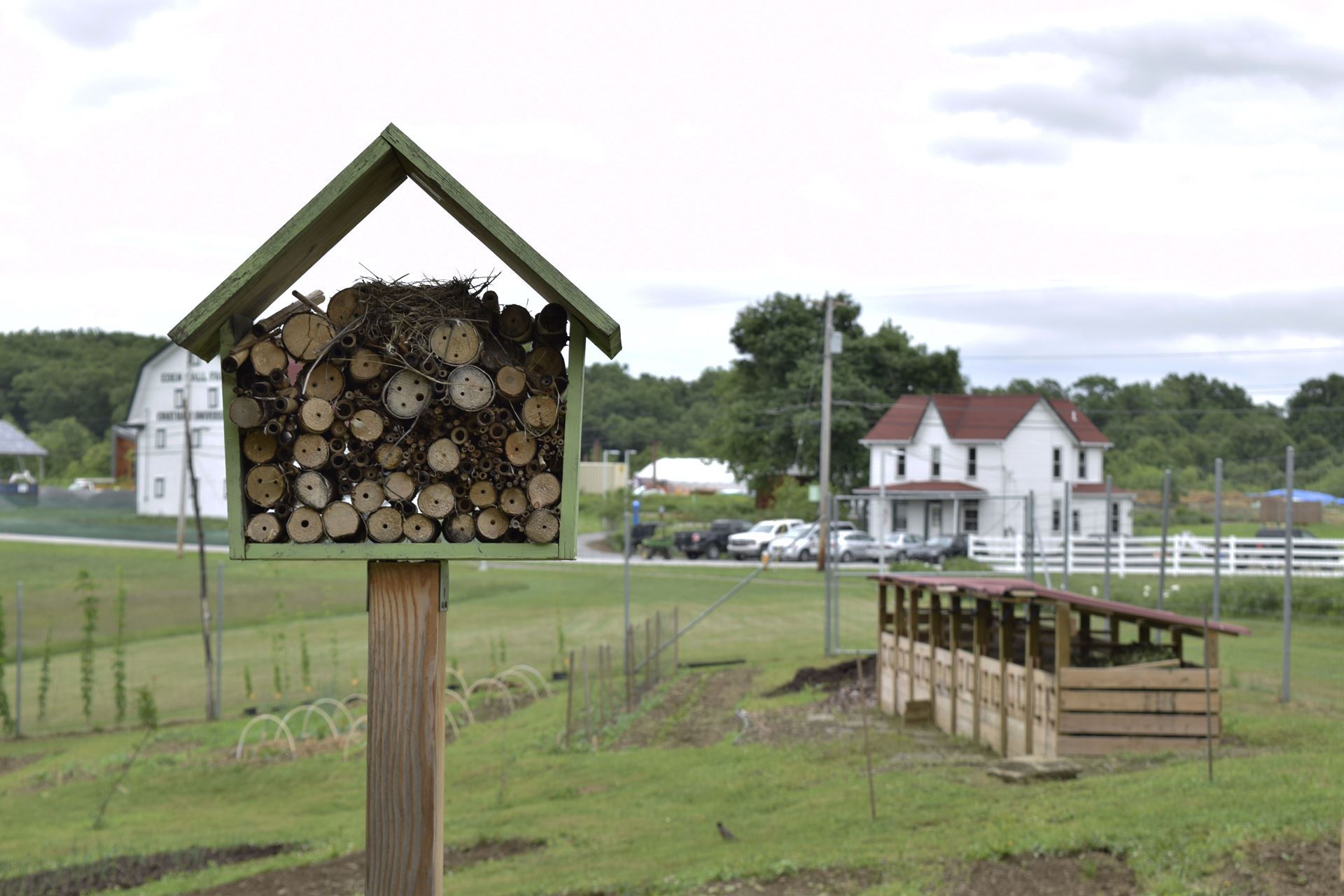 Dr. Peter Walker pointed to a grassy hillside, where he plans to keep the goats with a protective llama. “It acts as kind of a guard dog against the coyotes,” he explains. The backdrop of the grassy hillside is woodlands, where oyster mushrooms are cultivated. A neat garden sits alongside, with crops such as perennials, hops, even rye for Wigle Whiskey.
Dr. Peter Walker pointed to a grassy hillside, where he plans to keep the goats with a protective llama. “It acts as kind of a guard dog against the coyotes,” he explains. The backdrop of the grassy hillside is woodlands, where oyster mushrooms are cultivated. A neat garden sits alongside, with crops such as perennials, hops, even rye for Wigle Whiskey.
“We’ve had many students interested in the Wigle project,” comments Dr. Walker.
In addition to the goats and llama, the property will one day be capable of hosting 1,500 students, with 64 residents in the first dorm. The campus is Eden Hall, home to the Chatham University Falk School of Sustainability, of which Dr. Walker is Dean. Located just 30 minutes north of Pittsburgh, Eden Hall is a fully sustainable, almost off-the-grid campus, where students spend more time experimenting in the nearby woodlands and meadows than in the classroom. “I really don’t want people in classrooms too much,” says Dr. Walker. “You learn by doing. You learn by experiments.”
For future students that dream to learn about sustainability by “doing,” Eden Hall is a rare campus that is built from the bottom up with sustainability in mind. A simple walk through the campus demonstrates that full sustainability takes more than the occasional solar panel and heat-efficient windows. Eden Hall incorporates a remarkable array of technologies that unite to make a self-sufficient campus. What went into consideration when designing a campus completely around sustainability?
System 1: Energy
 Dr. Walker points at a white pipe sticking out of the ground. “I’ve never seen a sexy picture of a geothermal well,” he shrugs. While the exposed pipe’s charms are debatable, it accesses an impressive underground piping system that helps to maintain indoor climate control. In the summer, the fluid within the pipes extract heat from the buildings, and runs that heat deep into the ground, where the temperature stays at a constant 50 - 60°F. After the pipes are cooled to this below-surface temperature, the fluid is routed back to the buildings to extract more heat.
Dr. Walker points at a white pipe sticking out of the ground. “I’ve never seen a sexy picture of a geothermal well,” he shrugs. While the exposed pipe’s charms are debatable, it accesses an impressive underground piping system that helps to maintain indoor climate control. In the summer, the fluid within the pipes extract heat from the buildings, and runs that heat deep into the ground, where the temperature stays at a constant 50 - 60°F. After the pipes are cooled to this below-surface temperature, the fluid is routed back to the buildings to extract more heat.
In winter, the system works in reverse, extracting the heat from deep underground and pumping warmed fluid back through the pipes to the chilly buildings. As the fluid is cooled, it is routed underground again to warm back up. Thus, to achieve the desired 72 °F indoors, the climate control system doesn’t need to heat up the building from frigid winter temperatures; it needs only to raise the temperature from the 50-60 °F baseline.
Solar panels cover nearly every south-facing roof, generating the electricity that drives the heat pumps (for those last few degrees of winter climate control), the geothermal pumps, the lights and any electrical equipment. On sunny days, excess energy is sold to the grid, while on cloudy days and at night, energy is pulled back. This system currently has a net positive energy balance: more energy is generated than is used.
System 2: Water
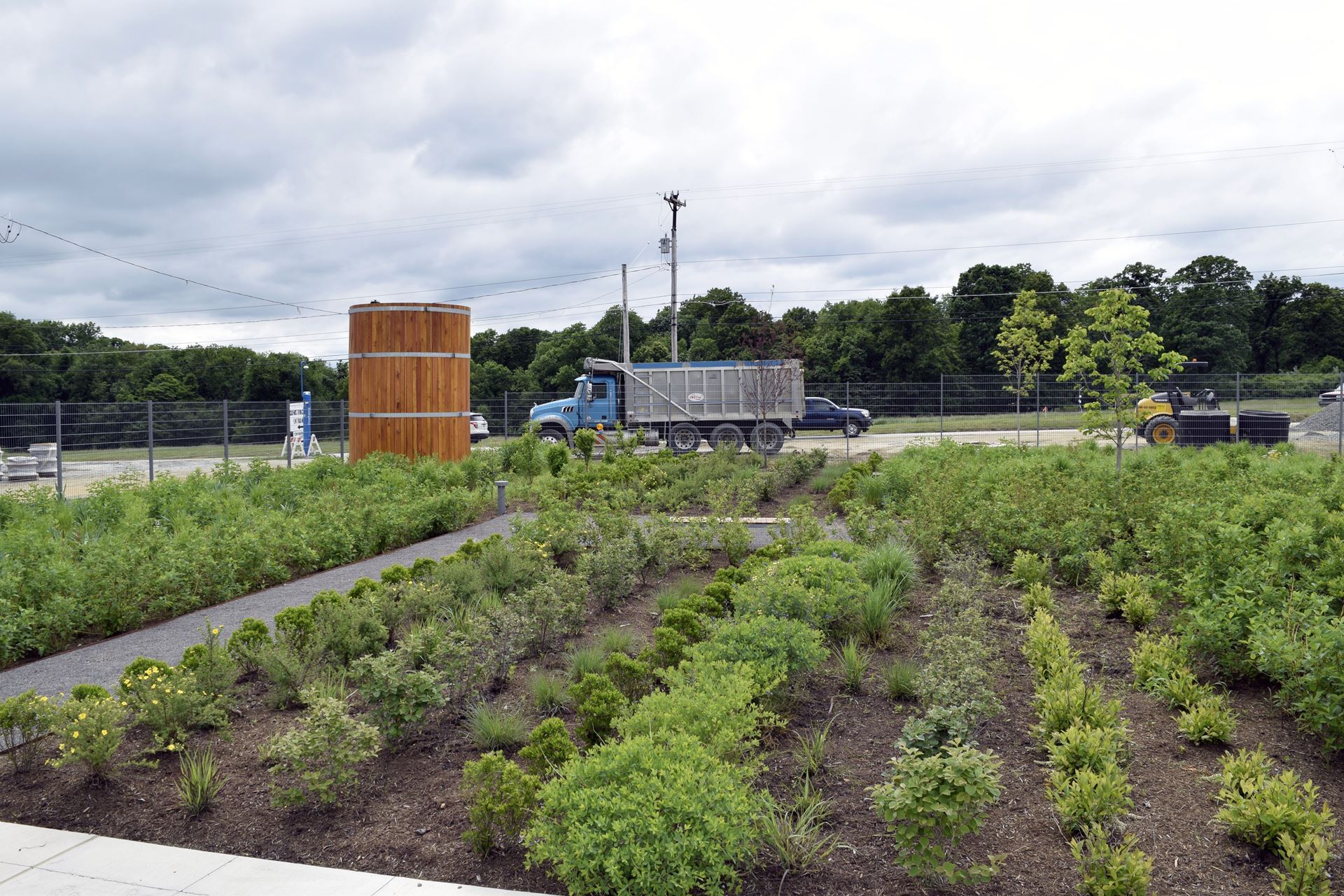 Water recycling undergoes an equally sophisticated process. Stormwater runoff and grey water first enters an underground holding tank. Next, the water trickles through a charcoal filter and then through a biofilm membrane. The water is then piped to marsh plants, where the roots absorb excess nutrients. Finally, the water is piped through a sand filter and blasted with UV radiation.
Water recycling undergoes an equally sophisticated process. Stormwater runoff and grey water first enters an underground holding tank. Next, the water trickles through a charcoal filter and then through a biofilm membrane. The water is then piped to marsh plants, where the roots absorb excess nutrients. Finally, the water is piped through a sand filter and blasted with UV radiation.
Unfortunately, while this water is safe to drink, regulation added a snag. “Even though we can produce water that is clean enough to drink on campus, regulations would require us to chlorinate it,” Dr. Walker explains. In other words, Eden Hall would have to be regulated as a city municipal water treatment establishment before water could be consumed. “That seemed like overkill.” Instead, the water treated on-site is recycled in the toilets and irrigation systems, and the drinking water is taken from the city supply. While this regulatory catch is the only thing keeping Eden Hall from being entirely off the grid, Dr. Walker is not discouraged. “I guess it goes with the territory of being pioneers,” he says. “We are out ahead of the regulations!”
System 3: Building
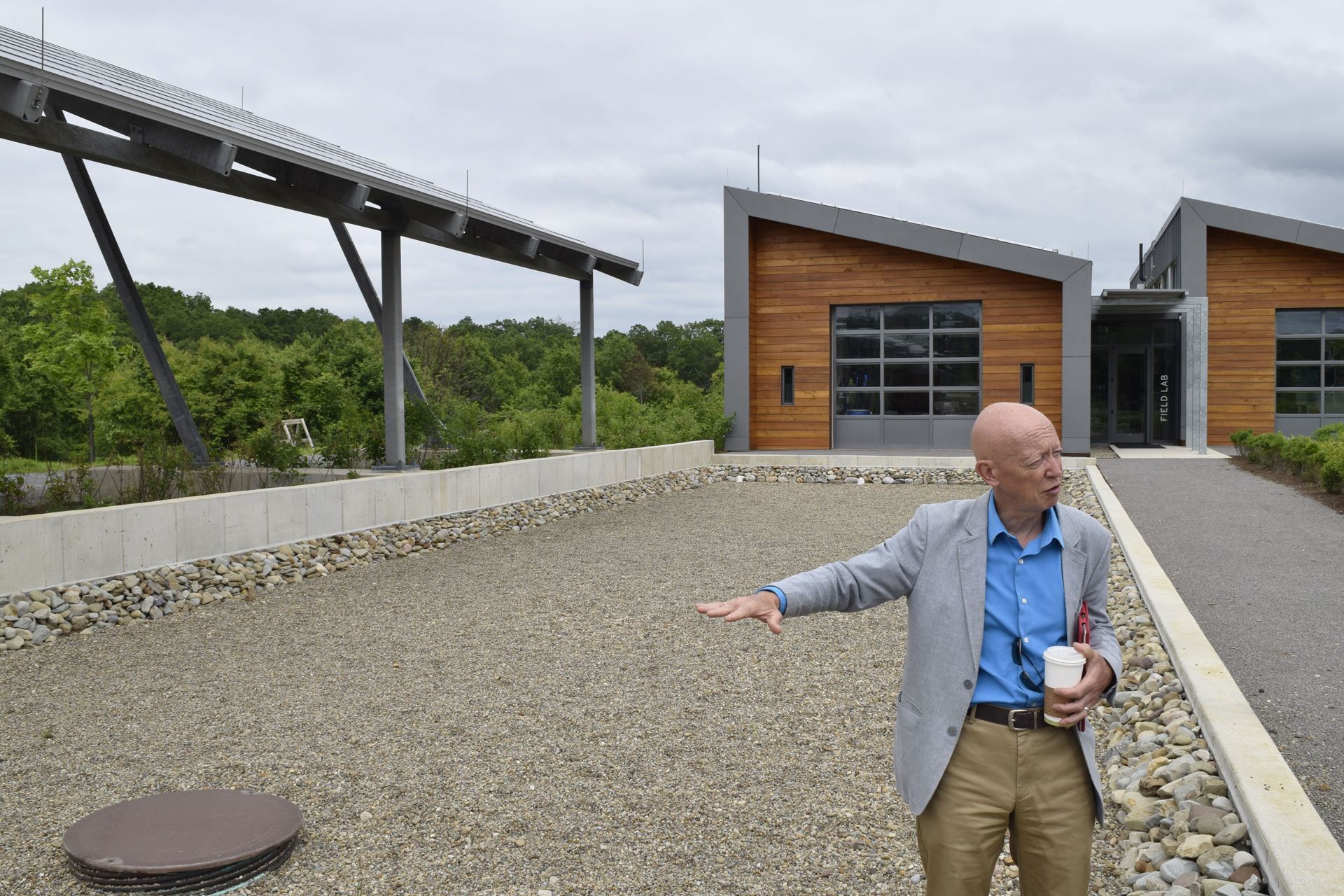 “If you think in a place with big views, you think big ideas,” Dr. Walker declares. Wooden, asymmetric frames are all built below the tree line and incorporated with large windows to let in plenty of natural light. A dairy barn has been repurposed as a small coffee shop, which Dr. Walker is hoping will quickly become the neighborhood hot spot. And in the center of the campus sits a large outdoor amphitheater, which currently hosts performances ranging from bluegrass concerts to opera shows.
“If you think in a place with big views, you think big ideas,” Dr. Walker declares. Wooden, asymmetric frames are all built below the tree line and incorporated with large windows to let in plenty of natural light. A dairy barn has been repurposed as a small coffee shop, which Dr. Walker is hoping will quickly become the neighborhood hot spot. And in the center of the campus sits a large outdoor amphitheater, which currently hosts performances ranging from bluegrass concerts to opera shows.
The campus is both aesthetically pleasing as well as practical. The pavements are permeable to reduce stormwater runoff. Buildings are certified at the highest standard of the US Green Building Council, LEED Platinum. The campus is not surrounded by traditional lawns, but with naturally growing meadows and wildflowers (to be kept trim by those goats). “I don’t really believe in lawns,” says Dr. Walker, referring to the constant need for watering, fertilizing, and mowing of the favored suburban turf.
System 4: Food
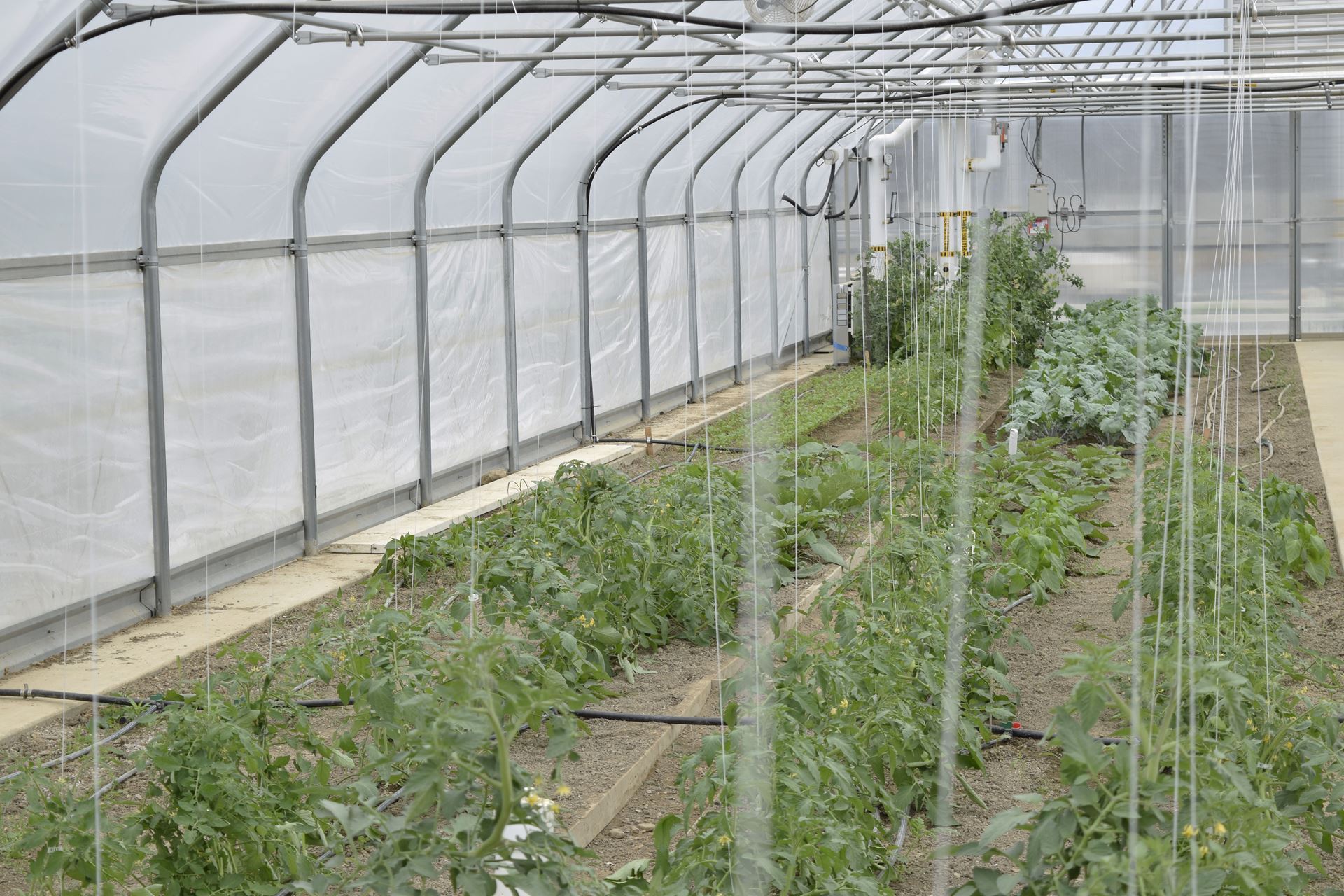 A central part of the Eden Hall campus is the Food Studies program, which combines classroom learning with hands-on experimentation. “The Food Studies program has been operating out of Eden Hall campus part-time since its inception in 2010,” says Dr. Alice Julier, program director of Chatham Food Studies program. “It is integrally tied to Eden Hall because we get to practice what we preach.”
A central part of the Eden Hall campus is the Food Studies program, which combines classroom learning with hands-on experimentation. “The Food Studies program has been operating out of Eden Hall campus part-time since its inception in 2010,” says Dr. Alice Julier, program director of Chatham Food Studies program. “It is integrally tied to Eden Hall because we get to practice what we preach.”
Students can take courses on grains, specializing in everything from crop science to culinary processes to fermentation. There are courses on sustainable meats that take you from pasturing to butchering. Students can practice from start to finish the process of making cheese, yogurt, and other dairy products. “Most recently, we developed a course on coffee,” Dr. Julier adds. “Students look at both production and consumption with La Prima and other coffee roasters. Our cafe will likely feature our Eden Hall blend, but we will also do outreach workshops on small batch roasting and tasting.”
A happy result of the prominence of the Food Studies program is a campus food system that offers a farm-to-table experience that would make even noted local chef Kevin Sousa green with envy. The goats on the grassy hillside will serve to both naturally keep the meadowland trim, and provide milk for cheese. Trout will be caught from the aquaponics tanks set adjacent to the classrooms. Seasonal fruits and vegetables will come straight from the students’ experimental garden, equipped with movable greenhouses to prevent overuse of the land. One large greenhouse, the “solar tunnel,” is heated with solar panels and vegetables are grown year-round.
System 5: Social
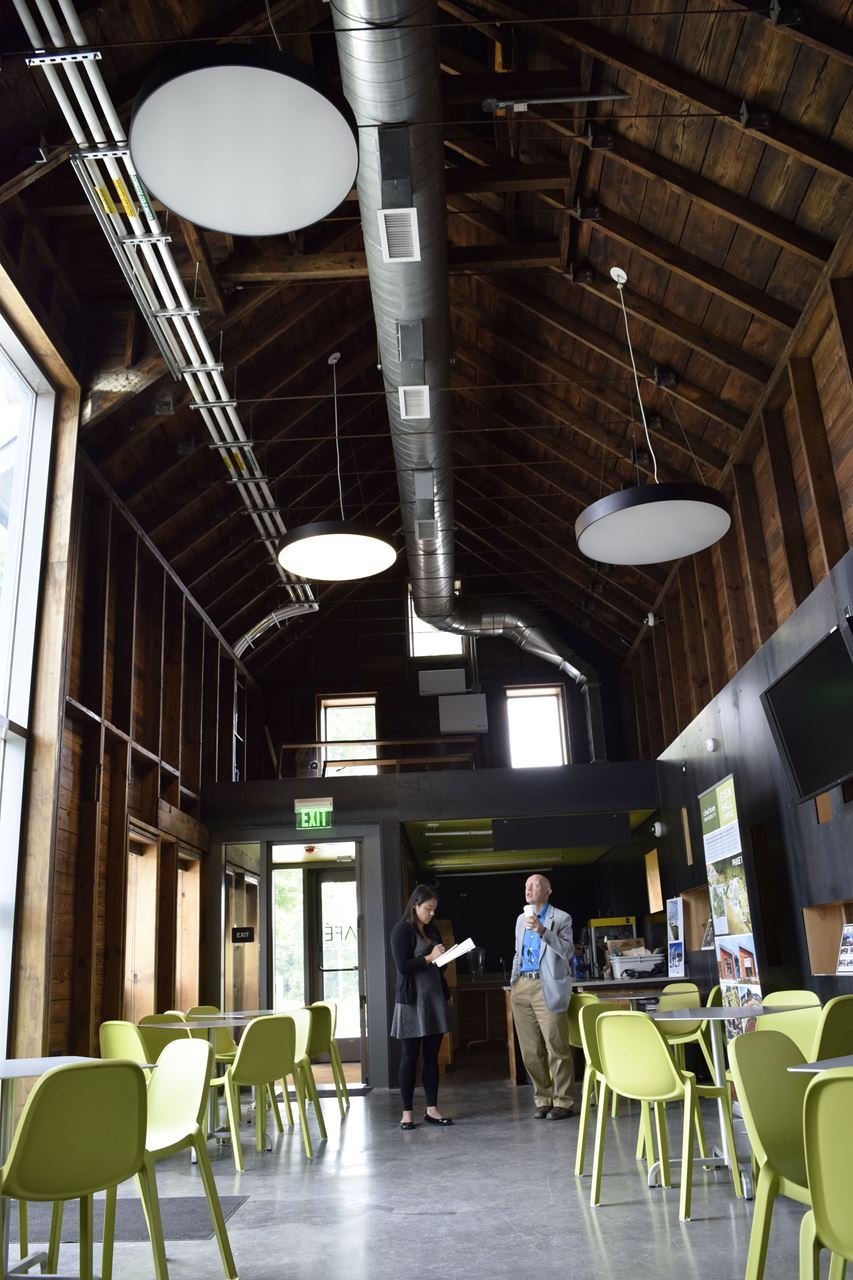 “That’s the easy bit,” says Dr. Walker about the first four sustainable systems. “What we’re dealing with now is moving this project we’ve built into a social program.” While designing and building a completely sustainable campus was an accomplished feat, perhaps the more important aspect of sustainability is changing people’s behavior. The Falk School of Sustainability aims to go further than just encourage students to recycle. Student dorm rooms are equipped with sensors to warn students if they leave the windows open too long, allowing heating or cooling to escape the building. And all kitchen spaces are communal. This offers a chance for community bonding, but also saves on energy costs associated with individual hotplates and mini fridges. “The first group of students are really going to be pioneers,” says Dr. Walker.
“That’s the easy bit,” says Dr. Walker about the first four sustainable systems. “What we’re dealing with now is moving this project we’ve built into a social program.” While designing and building a completely sustainable campus was an accomplished feat, perhaps the more important aspect of sustainability is changing people’s behavior. The Falk School of Sustainability aims to go further than just encourage students to recycle. Student dorm rooms are equipped with sensors to warn students if they leave the windows open too long, allowing heating or cooling to escape the building. And all kitchen spaces are communal. This offers a chance for community bonding, but also saves on energy costs associated with individual hotplates and mini fridges. “The first group of students are really going to be pioneers,” says Dr. Walker.
Forging the fully sustainable campus was no easy task, and the project was initially estimated to cost $40 million. This fall, the new Eden Hall campus is finally open for business.
But perhaps the largest challenge is getting the word out to the targeted students that will appreciate the unique experience Eden Hall has to offer. The Eden Hall campus is not for the average student, as it does not yet have the social clubs and community that a larger campus can offer. Students looking for the college experience promised in movies like “Animal House”or “Rudy” may be better off taking classes elsewhere. However, for students that want complete immersion in sustainability, and want to learn in the pastures and woodlands as well as the classroom, Eden Hall may be a once in a lifetime opportunity.
